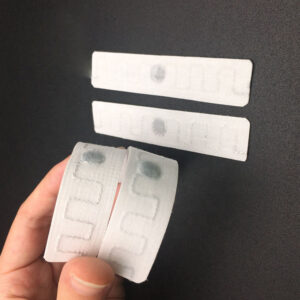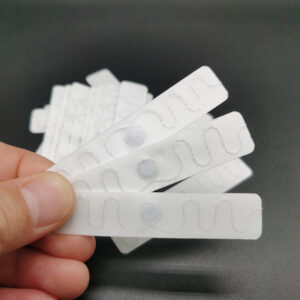UHF laundry tag | NXP U CODE 9 Chip
UHF laundry tags showcase an exceptional ability to function consistently despite exposure to rigorous laundry processes, which include sterilization, heated washing, cleaning, drying, and ironing. They are built to endure hundreds of laundry cycles and still maintain high-level RFID performance. This consistency even after numerous washes ensures efficient tracking and inventory management throughout the lifespan of linens, clothing, and other textile items.
Description
| Specifications | ||
| Compliance | EPC Class1 Gen2, ISO18000-6C | |
| Frequency | 860~928 MHz, FCC, ETIS or customized | |
| Type | Sewing type ,Heating type ,Hang type | |
| Micro Chip | NXP UCODE 8, UCOCE 9 | |
| Memory | UCODE 8: EPC 96/128bits, User 0/32bits, access | |
| UCODE 9: EPC 96bits, User 0bits, access password 0bit password 32bits | ||
| Size | 55x12x1.6mm | 70x15x1.6mm |
| Read Range | Up to 5m | Up to 7m |
| Data Storage | 50 years | |
| Lifetime | 200 wash cycles or 2 years | |
| Material | Cotton 65% / Polyester 30% Blended fabric | |
| Product weight | Around 0.4~0.5g | |
| Delivery format | 100-300 pieces in Separately | |
| Package | Antistatic package / carton | |
| Color | White | |
| Electronic Performance | ||
| Laundry Cycle Performance | Washing: +90°C (194°F) / 60 minutes | |
| Drying: +180°C (356°F) / 3 minutes (dehydration press: 35 bar) | ||
| Ironer: 195°C (383°F) / 30 seconds < 18 bars | ||
| Water Extractor Press: 60 bars | ||
| Sterilization Process: +134°C (273°F) / 20 minutes | ||
| Life time | 200 times of industrial laundry with water extraction press drying | |
| Chemical resistant | 100% proof for normal laundry solutions. | |
Installation
Stitch Tagging: To be stitched into the hem of a textile. Stitch the laundry tag away from the folding lines.
Heat Sealing: To be heat-sealed directly on the textile at +200°C (392°F), for 12~14s.
In Pouch: To be stitched like a standard care label. Stitch the laundry tag away from the folding lines.
-
Healthcare: Hospitals and other medical facilities use RFID linen tags to manage huge inventories of bed sheets, towels, scrubs, uniforms, and surgical linens. This helps reduce loss, manage laundry cycles, and ensure clean, fresh linens are always available as required.
-
Hotels: Managing linens is a huge task in the hotel industry, where thousands of items, from bedding to towels to curtains and robes, are in circulation. RFID linen tags simplify tracking, ensuring timely cleaning and replacement, and helps in detecting and preventing theft.
-
Restaurants: In the food service industry, RFID tags can monitor the usage and cleaning of uniforms, tablecloths, napkins, and chef’s aprons. This can improve cleanliness standards and aid in maintaining a polished, professional appearance.
-
Fashion Apparel Industries: RFID tags play a huge role in tracking items throughout the supply chain, from production to retail. They can provide valuable information like origin, travel history, and even details about the fabric and care instructions.
-
Workwear/Fire Retardant Clothing: Companies can use RFID tags to track and manage specialty clothing items. This can include ensuring fire retardant or other protective clothing is inspected regularly, properly cleaned, and replaced as necessary.
-
Footwear and Masks: Especially important in industries like healthcare and construction where safety is critical, tracking the usage, cleaning, and maintenance of items like masks and safety shoes can be simplified with the use of RFID tags.
-
Mats and Mops: For businesses providing cleaning services or managing large facilities, RFID tags on mats and mops can help track usage and maintenance, ensuring clean and effective tools at all times.








